|
|
 |
 |
 |
| 1. Olle Trekking |
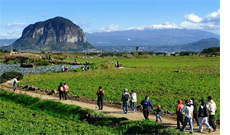 Olle, a Jeju dialect meaning “narrow paths,” is like an oasis for many who wish to get away from the bustle of city life. In Jeju’s Olle courses, trekkers can walk on unpaved paths and even face rocky roads near cliffs. Olle, a Jeju dialect meaning “narrow paths,” is like an oasis for many who wish to get away from the bustle of city life. In Jeju’s Olle courses, trekkers can walk on unpaved paths and even face rocky roads near cliffs.
There are a total of 15 trekking courses along the seashore and the inland regions on Jeju Island.
Walking along the path near the southern coast is another opportunity you must not miss. This path will enable you to witness the simple lifestyles of the people of Jeju and see wild animals up close.
For more information, please visit the website below. http://www.jejuolle.org:8080/eng/ |
| 2. Temple stay in Jeju Yakchunsa |
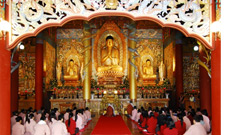 A Temple Stay is a cultural-experience program designed to help people understand Korean Buddhism better. Temple stays offer various kinds of practicing methods such as Yebul (ceremonial service involving chanting), Chamseon (Zen meditation), Dahdoh (tea ceremony) and Balwoo Gongyang (communal Buddhist meal service).
Yakcheonsa Temple was built in the Buddhist style of early Joseon dynasty in the height of 30 meters (same as a 10 story building) and the size of 3,305 square meters boasting to be the largest main prayer hall in Asia. A Temple Stay is a cultural-experience program designed to help people understand Korean Buddhism better. Temple stays offer various kinds of practicing methods such as Yebul (ceremonial service involving chanting), Chamseon (Zen meditation), Dahdoh (tea ceremony) and Balwoo Gongyang (communal Buddhist meal service).
Yakcheonsa Temple was built in the Buddhist style of early Joseon dynasty in the height of 30 meters (same as a 10 story building) and the size of 3,305 square meters boasting to be the largest main prayer hall in Asia. |
| 3. UNESCO World Natural Heritage Exploration |
The volcanic island of Jeju-do has an outstandingly beautiful natural environment that is significant for its geological features and ecological value. In 2007, Jeju-do Island was listed as a UNESCO Natural Heritage Site under the name of “Jeju Volcanic Island and Lava Tubes”. This includes Mount Hallasan Natural Reserve, the Geomunoreum Lava Tube System and Seongsan Ilchulbong Peak.
For more information, please visit http://www.hijeju.or.kr/english/main.html
 |
 |
| 1. Cheonjeyeon Waterfalls |
Cheonjeyeon Waterfalls, named 'The pond of God', consists of 3 parts. Around the falls, there are rare plants. There is a cave in the east and from the ceiling cold water pours down creating the waterfall.??The water from the first waterfall becomes the second and third waterfalls and flows into the sea.
It is located within a walking distance from the conference venue, ICC Jeju.
For more information, please click the website below.
http://english.tour2jeju.net/main/list.php?menu_id=12 |
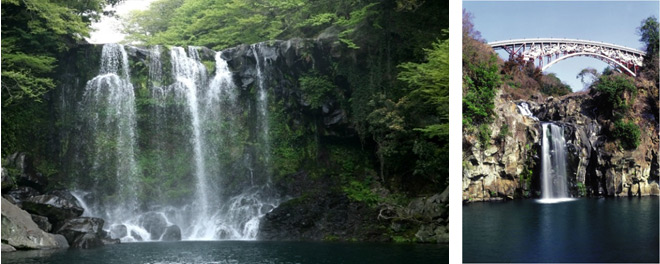 |
| 2. Jeju National Museum |
Jeju National Museum is a historical museum that displays, preserves and studies Jeju Island’s historical and cultural assets. Jeju National Museum houses various remains excavated from ruins, including meaningful relics from the prehistoric age through to the Joseon Dynasty. It boasts unique traditional culture and holds special exhibitions each year.
For more information, please visit the website below.
http://jeju.museum.go.kr/en/contents/main.php |
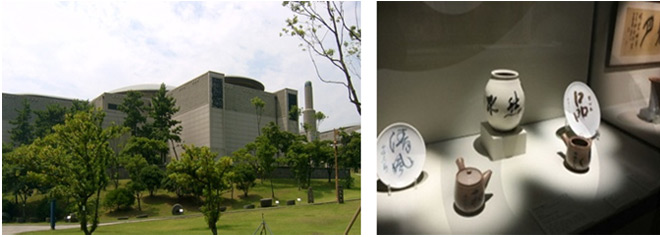 |
| 3. Jeju Folk Village Museum |
With a total of 117 houses and facilities, Jeju Folk Village Museum has restored the scenes of the village to that of the 1890’s. Among them are Mountain Village, Hill-Country Village, Fishing Village and Shamanism Village. On land of more than 40 acres it has been reconstructed following long-term research and analysis of experts.
The Jeju Folk Village Museum is the island’s main tourist attraction where customs of the old days can be explored.
For more information, please click the website below.
http://eng.jejufolk.com/html/index.aspx |
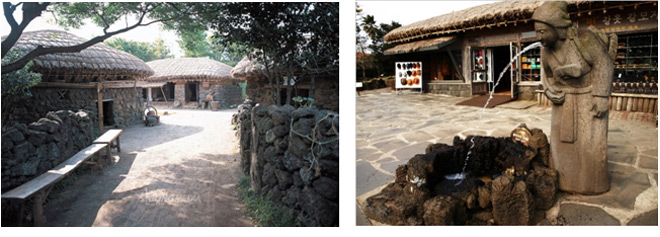 |
 |
| 1. Golf |
| There are about 30 golf courses on the island. There is one right there at Jungmun Resort Complex (Jungmun Golf Club). Some of the Golf Courses near the convention center and Seogwipo City. |
|
|
|
| Nine Bridges Golf |
Jeju Country Club
b |
Ellisian Country Club |
| Club
Raon Golf Club |
Jungmun Beach Golf Clu |
Ora Country Club |
| Lake Hills Jeju Country Club |
Castlerex Jeju Golf Club |
Shinan Aberrys Golf Club |
| Roadland Golf Club |
Crown Country Club |
Lareine Golf Club |
| Blackstone Golf Club |
Pinx Golf Club |
Cypress Golf Club |
| Sky Hill Jeju Country Club |
Haevichi Country Club |
Zephyrus Golf Club |
|
|
|
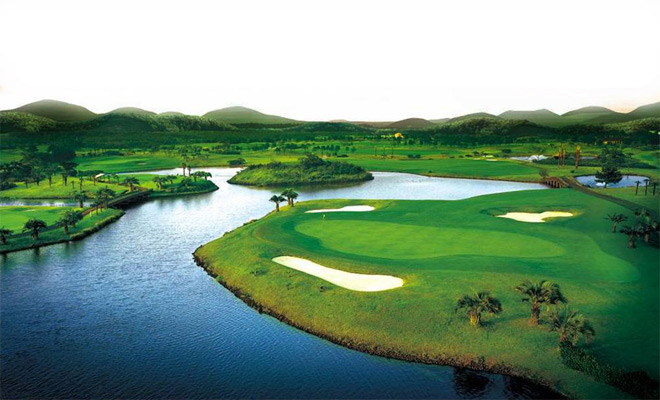 |
| 2. Horse riding |
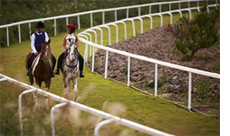 Jeju Island is an ideal place for raising horses. Throughout the year, there is little change in the temperature and rainfall. This creates a more favorable condition for grasslands than on the mainland and feed crops can be grown even in winter. Throughout the island, you can easily find places that offer horse riding.
With the help of a horse trainer, novices can take the beginner lesson of trotting inside a designated area. Jeju Island is an ideal place for raising horses. Throughout the year, there is little change in the temperature and rainfall. This creates a more favorable condition for grasslands than on the mainland and feed crops can be grown even in winter. Throughout the island, you can easily find places that offer horse riding.
With the help of a horse trainer, novices can take the beginner lesson of trotting inside a designated area. |
| 3. Other activities in Jeju |
 |
|
|
